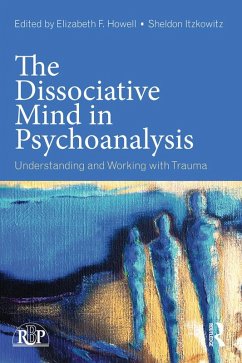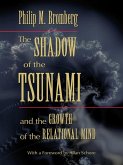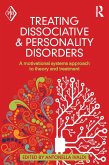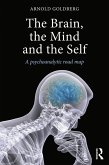The Dissociative Mind in Psychoanalysis (eBook, ePUB)
Understanding and Working With Trauma
Redaktion: Howell, Elizabeth; Itzkowitz, Sheldon
45,95 €
45,95 €
inkl. MwSt.
Sofort per Download lieferbar

23 °P sammeln
45,95 €
Als Download kaufen

45,95 €
inkl. MwSt.
Sofort per Download lieferbar

23 °P sammeln
Jetzt verschenken
Alle Infos zum eBook verschenken
45,95 €
inkl. MwSt.
Sofort per Download lieferbar
Alle Infos zum eBook verschenken

23 °P sammeln
The Dissociative Mind in Psychoanalysis (eBook, ePUB)
Understanding and Working With Trauma
Redaktion: Howell, Elizabeth; Itzkowitz, Sheldon
- Format: ePub
- Merkliste
- Auf die Merkliste
- Bewerten Bewerten
- Teilen
- Produkt teilen
- Produkterinnerung
- Produkterinnerung

Bitte loggen Sie sich zunächst in Ihr Kundenkonto ein oder registrieren Sie sich bei
bücher.de, um das eBook-Abo tolino select nutzen zu können.
Hier können Sie sich einloggen
Hier können Sie sich einloggen
Sie sind bereits eingeloggt. Klicken Sie auf 2. tolino select Abo, um fortzufahren.

Bitte loggen Sie sich zunächst in Ihr Kundenkonto ein oder registrieren Sie sich bei bücher.de, um das eBook-Abo tolino select nutzen zu können.
In this book, distinguished contributors give a comprehensive overview of where we are with current thinking on trauma and dissociation
- Geräte: eReader
- mit Kopierschutz
- eBook Hilfe
- Größe: 1.55MB
Andere Kunden interessierten sich auch für
![The Dissociative Mind (eBook, ePUB) The Dissociative Mind (eBook, ePUB)]() Elizabeth F. HowellThe Dissociative Mind (eBook, ePUB)46,95 €
Elizabeth F. HowellThe Dissociative Mind (eBook, ePUB)46,95 €![Mended by the Muse: Creative Transformations of Trauma (eBook, ePUB) Mended by the Muse: Creative Transformations of Trauma (eBook, ePUB)]() Sophia RichmanMended by the Muse: Creative Transformations of Trauma (eBook, ePUB)48,95 €
Sophia RichmanMended by the Muse: Creative Transformations of Trauma (eBook, ePUB)48,95 €![The Shadow of the Tsunami (eBook, ePUB) The Shadow of the Tsunami (eBook, ePUB)]() Philip M. BrombergThe Shadow of the Tsunami (eBook, ePUB)35,95 €
Philip M. BrombergThe Shadow of the Tsunami (eBook, ePUB)35,95 €![Treating Dissociative and Personality Disorders (eBook, ePUB) Treating Dissociative and Personality Disorders (eBook, ePUB)]() Treating Dissociative and Personality Disorders (eBook, ePUB)45,95 €
Treating Dissociative and Personality Disorders (eBook, ePUB)45,95 €![Awakening the Dreamer (eBook, ePUB) Awakening the Dreamer (eBook, ePUB)]() Philip M. BrombergAwakening the Dreamer (eBook, ePUB)43,95 €
Philip M. BrombergAwakening the Dreamer (eBook, ePUB)43,95 €![Understanding and Treating Dissociative Identity Disorder (eBook, ePUB) Understanding and Treating Dissociative Identity Disorder (eBook, ePUB)]() Elizabeth F. HowellUnderstanding and Treating Dissociative Identity Disorder (eBook, ePUB)50,95 €
Elizabeth F. HowellUnderstanding and Treating Dissociative Identity Disorder (eBook, ePUB)50,95 €![The Brain, the Mind and the Self (eBook, ePUB) The Brain, the Mind and the Self (eBook, ePUB)]() Arnold GoldbergThe Brain, the Mind and the Self (eBook, ePUB)45,95 €
Arnold GoldbergThe Brain, the Mind and the Self (eBook, ePUB)45,95 €-
-
-
In this book, distinguished contributors give a comprehensive overview of where we are with current thinking on trauma and dissociation
Dieser Download kann aus rechtlichen Gründen nur mit Rechnungsadresse in A, B, BG, CY, CZ, D, DK, EW, E, FIN, F, GR, HR, H, IRL, I, LT, L, LR, M, NL, PL, P, R, S, SLO, SK ausgeliefert werden.
Produktdetails
- Produktdetails
- Verlag: Taylor & Francis eBooks
- Seitenzahl: 294
- Erscheinungstermin: 5. Februar 2016
- Englisch
- ISBN-13: 9781317393504
- Artikelnr.: 44866382
- Verlag: Taylor & Francis eBooks
- Seitenzahl: 294
- Erscheinungstermin: 5. Februar 2016
- Englisch
- ISBN-13: 9781317393504
- Artikelnr.: 44866382
- Herstellerkennzeichnung Die Herstellerinformationen sind derzeit nicht verfügbar.
Elizabeth F. Howell, Ph.D., is the author of the award-winning books, The Dissociative Mind and Understanding and Treating Dissociative Identity Disorder: A Relational Approach. She is on the Editorial Board of the Journal of Trauma and Dissociation; Adjunct Clinical Associate Professor of Psychology, New York University Postdoctoral Program in Psychotherapy and Psychoanalysis; faculty, supervisor, Trauma Treatment Center, Manhattan Institute for Psychoanalysis; faculty, National Institute for Psychotherapies, faculty, Psychotherapy Training Program: International Society for the Study of Trauma and Dissociation, and an Honorary Member of the William Alanson White Psychoanalytic Society. She has written extensively and lectured nationally and internationally on various aspects of trauma and dissociation, as well as on gender and trauma/dissociation. She is in private practice in Manhattan. Sheldon Itzkowitz, Ph.D., is an Adjunct Clinical Associate Professor of Psychology and Clinical Consultant at the NYU Postdoctoral Program in Psychotherapy and Psychoanalysis; Guest Faculty, William Alanson White Institute, Eating Disorders, Compulsions, and Addictions Program; and on the teaching and supervisory faculty of the National Institute for the Psychotherapies Training Program in Psychoanalysis. He has presented his work on the treatment of extremely dissociated patients both nationally and internationally. He is an Associate Editor of Psychoanalytic Perspectives and a former President of the Division of Psychoanalysis of the New York State Psychological Association. He is in private practice in Manhattan.
Introduction Elizabeth F. Howell, Ph.D. & Sheldon Itzkowitz, Ph.D.
SECTION 1 History of Complex Trauma and Dissociative Problems in Living
1. Is Trauma-Analysis Psycho-Analysis Elizabeth F. Howell, Ph.D. & Sheldon
Itzkowitz, Ph.D.
2. From Trauma-Analysis to Psycho-Analysis And Back Again Elizabeth F.
Howell, Ph.D. & Sheldon Itzkowitz, Ph.D.
3. The Everywhereness of Trauma and the Dissociative Structuring of the
Mind Elizabeth F. Howell, Ph.D. & Sheldon Itzkowitz, Ph.D.
4. Pierre Janet, Sigmund Freud, and Dissociation of the Personality: The
First Codification of a Psychodynamic Depth Psychology Onno van der Hart,
Ph.D.
5. The Ferenczi Paradox: His Importance in Understanding Dissociation and
the Dissociation of His Importance in Psychoanalysis Margaret L. Hainer,
LCSW
SECTION 2 Psychoanalytic Orientations and the Treatment of Complex Trauma
Dissociation and Dissociative Disorders
6. Models of Dissociation in Freud's Work: Outcomes of Dissociation of
Trauma in Theory and Practice Elizabeth F. Howell, Ph.D.
7. Jung and Dissociation: Complexes, Dreams, and the Mythopoetic Psyche
Donald Kalsched, Ph.D.
8. 'A Queer Kind of Truth': Winnicott and the Uses of Dissociation Dodi
Goldman, Ph.D.
9. A Kleinian Perspective on Dissociation and Trauma: Miscarriages in
Symbolization Joseph Newirth, Ph.D.
10. It Never Entered My Mind Philip Bromberg, Ph.D.
11. Precarious Places: Intersubjectivity in Traumatized States Jennifer
Leighton LCSW
12. Latah: An Ethnic Syndrome With Dissociative Features - A
Sadomasochistic Pattern? Elizabeth Hegeman, Ph.D.
SECTION 3 Aspects of Psychoanalytic Treatment of Complex Trauma and
Dissociation
13. Thoughts on Working with the Dreams of DID and DDNOS Patients Richard
P. Kluft, M.D., Ph.D.
14. Who Moved My 'Swiss' Cheese? Eating Disorders And The Use Of
Dissociation As An Attempt To Fill In The 'Whole' Jean Petrucelli, Ph.D.
15. A Bell Rings In The Empty Sky: Dissociative Attunement In A Resonant
World Karen Hopenwasser, M.D.
16. Divide and Multiply; A Multi-Dimensional View of Dissociative Processes
Wilma Bucci, Ph.D.
17. The Personal Diagnostic Crisis: The Acknowledgement of Self-States in
DID Richard A. Chefetz, M.D.
18. Psychoactive Therapy Of DID: A Multiphasic Model Ira Brenner, M.D.
19. The Seeming Absence of Children With DID Valerie Sinason, Ph.D.
SECTION 4 Current Research Trends in Complex Trauma Dissociation and
Dissociative Disorders
20. A Tale of Two Offenders: Why Dissociation Is Under-Diagnosed In
Forensic Populations Abby Stein, Ph.D.
21. An Update On Research About the Validity, Assessment, and Treatment of
DID Bethany Brand, Ph.D. & Daniel Brown B.S.
22. Speaking One's Dissociated Mind: So Should My Thoughts Be Severed From
My Griefs and Woes Brian Koehler, Ph.D.
SECTION 1 History of Complex Trauma and Dissociative Problems in Living
1. Is Trauma-Analysis Psycho-Analysis Elizabeth F. Howell, Ph.D. & Sheldon
Itzkowitz, Ph.D.
2. From Trauma-Analysis to Psycho-Analysis And Back Again Elizabeth F.
Howell, Ph.D. & Sheldon Itzkowitz, Ph.D.
3. The Everywhereness of Trauma and the Dissociative Structuring of the
Mind Elizabeth F. Howell, Ph.D. & Sheldon Itzkowitz, Ph.D.
4. Pierre Janet, Sigmund Freud, and Dissociation of the Personality: The
First Codification of a Psychodynamic Depth Psychology Onno van der Hart,
Ph.D.
5. The Ferenczi Paradox: His Importance in Understanding Dissociation and
the Dissociation of His Importance in Psychoanalysis Margaret L. Hainer,
LCSW
SECTION 2 Psychoanalytic Orientations and the Treatment of Complex Trauma
Dissociation and Dissociative Disorders
6. Models of Dissociation in Freud's Work: Outcomes of Dissociation of
Trauma in Theory and Practice Elizabeth F. Howell, Ph.D.
7. Jung and Dissociation: Complexes, Dreams, and the Mythopoetic Psyche
Donald Kalsched, Ph.D.
8. 'A Queer Kind of Truth': Winnicott and the Uses of Dissociation Dodi
Goldman, Ph.D.
9. A Kleinian Perspective on Dissociation and Trauma: Miscarriages in
Symbolization Joseph Newirth, Ph.D.
10. It Never Entered My Mind Philip Bromberg, Ph.D.
11. Precarious Places: Intersubjectivity in Traumatized States Jennifer
Leighton LCSW
12. Latah: An Ethnic Syndrome With Dissociative Features - A
Sadomasochistic Pattern? Elizabeth Hegeman, Ph.D.
SECTION 3 Aspects of Psychoanalytic Treatment of Complex Trauma and
Dissociation
13. Thoughts on Working with the Dreams of DID and DDNOS Patients Richard
P. Kluft, M.D., Ph.D.
14. Who Moved My 'Swiss' Cheese? Eating Disorders And The Use Of
Dissociation As An Attempt To Fill In The 'Whole' Jean Petrucelli, Ph.D.
15. A Bell Rings In The Empty Sky: Dissociative Attunement In A Resonant
World Karen Hopenwasser, M.D.
16. Divide and Multiply; A Multi-Dimensional View of Dissociative Processes
Wilma Bucci, Ph.D.
17. The Personal Diagnostic Crisis: The Acknowledgement of Self-States in
DID Richard A. Chefetz, M.D.
18. Psychoactive Therapy Of DID: A Multiphasic Model Ira Brenner, M.D.
19. The Seeming Absence of Children With DID Valerie Sinason, Ph.D.
SECTION 4 Current Research Trends in Complex Trauma Dissociation and
Dissociative Disorders
20. A Tale of Two Offenders: Why Dissociation Is Under-Diagnosed In
Forensic Populations Abby Stein, Ph.D.
21. An Update On Research About the Validity, Assessment, and Treatment of
DID Bethany Brand, Ph.D. & Daniel Brown B.S.
22. Speaking One's Dissociated Mind: So Should My Thoughts Be Severed From
My Griefs and Woes Brian Koehler, Ph.D.
Introduction Elizabeth F. Howell, Ph.D. & Sheldon Itzkowitz, Ph.D.
SECTION 1 History of Complex Trauma and Dissociative Problems in Living
1. Is Trauma-Analysis Psycho-Analysis Elizabeth F. Howell, Ph.D. & Sheldon
Itzkowitz, Ph.D.
2. From Trauma-Analysis to Psycho-Analysis And Back Again Elizabeth F.
Howell, Ph.D. & Sheldon Itzkowitz, Ph.D.
3. The Everywhereness of Trauma and the Dissociative Structuring of the
Mind Elizabeth F. Howell, Ph.D. & Sheldon Itzkowitz, Ph.D.
4. Pierre Janet, Sigmund Freud, and Dissociation of the Personality: The
First Codification of a Psychodynamic Depth Psychology Onno van der Hart,
Ph.D.
5. The Ferenczi Paradox: His Importance in Understanding Dissociation and
the Dissociation of His Importance in Psychoanalysis Margaret L. Hainer,
LCSW
SECTION 2 Psychoanalytic Orientations and the Treatment of Complex Trauma
Dissociation and Dissociative Disorders
6. Models of Dissociation in Freud's Work: Outcomes of Dissociation of
Trauma in Theory and Practice Elizabeth F. Howell, Ph.D.
7. Jung and Dissociation: Complexes, Dreams, and the Mythopoetic Psyche
Donald Kalsched, Ph.D.
8. 'A Queer Kind of Truth': Winnicott and the Uses of Dissociation Dodi
Goldman, Ph.D.
9. A Kleinian Perspective on Dissociation and Trauma: Miscarriages in
Symbolization Joseph Newirth, Ph.D.
10. It Never Entered My Mind Philip Bromberg, Ph.D.
11. Precarious Places: Intersubjectivity in Traumatized States Jennifer
Leighton LCSW
12. Latah: An Ethnic Syndrome With Dissociative Features - A
Sadomasochistic Pattern? Elizabeth Hegeman, Ph.D.
SECTION 3 Aspects of Psychoanalytic Treatment of Complex Trauma and
Dissociation
13. Thoughts on Working with the Dreams of DID and DDNOS Patients Richard
P. Kluft, M.D., Ph.D.
14. Who Moved My 'Swiss' Cheese? Eating Disorders And The Use Of
Dissociation As An Attempt To Fill In The 'Whole' Jean Petrucelli, Ph.D.
15. A Bell Rings In The Empty Sky: Dissociative Attunement In A Resonant
World Karen Hopenwasser, M.D.
16. Divide and Multiply; A Multi-Dimensional View of Dissociative Processes
Wilma Bucci, Ph.D.
17. The Personal Diagnostic Crisis: The Acknowledgement of Self-States in
DID Richard A. Chefetz, M.D.
18. Psychoactive Therapy Of DID: A Multiphasic Model Ira Brenner, M.D.
19. The Seeming Absence of Children With DID Valerie Sinason, Ph.D.
SECTION 4 Current Research Trends in Complex Trauma Dissociation and
Dissociative Disorders
20. A Tale of Two Offenders: Why Dissociation Is Under-Diagnosed In
Forensic Populations Abby Stein, Ph.D.
21. An Update On Research About the Validity, Assessment, and Treatment of
DID Bethany Brand, Ph.D. & Daniel Brown B.S.
22. Speaking One's Dissociated Mind: So Should My Thoughts Be Severed From
My Griefs and Woes Brian Koehler, Ph.D.
SECTION 1 History of Complex Trauma and Dissociative Problems in Living
1. Is Trauma-Analysis Psycho-Analysis Elizabeth F. Howell, Ph.D. & Sheldon
Itzkowitz, Ph.D.
2. From Trauma-Analysis to Psycho-Analysis And Back Again Elizabeth F.
Howell, Ph.D. & Sheldon Itzkowitz, Ph.D.
3. The Everywhereness of Trauma and the Dissociative Structuring of the
Mind Elizabeth F. Howell, Ph.D. & Sheldon Itzkowitz, Ph.D.
4. Pierre Janet, Sigmund Freud, and Dissociation of the Personality: The
First Codification of a Psychodynamic Depth Psychology Onno van der Hart,
Ph.D.
5. The Ferenczi Paradox: His Importance in Understanding Dissociation and
the Dissociation of His Importance in Psychoanalysis Margaret L. Hainer,
LCSW
SECTION 2 Psychoanalytic Orientations and the Treatment of Complex Trauma
Dissociation and Dissociative Disorders
6. Models of Dissociation in Freud's Work: Outcomes of Dissociation of
Trauma in Theory and Practice Elizabeth F. Howell, Ph.D.
7. Jung and Dissociation: Complexes, Dreams, and the Mythopoetic Psyche
Donald Kalsched, Ph.D.
8. 'A Queer Kind of Truth': Winnicott and the Uses of Dissociation Dodi
Goldman, Ph.D.
9. A Kleinian Perspective on Dissociation and Trauma: Miscarriages in
Symbolization Joseph Newirth, Ph.D.
10. It Never Entered My Mind Philip Bromberg, Ph.D.
11. Precarious Places: Intersubjectivity in Traumatized States Jennifer
Leighton LCSW
12. Latah: An Ethnic Syndrome With Dissociative Features - A
Sadomasochistic Pattern? Elizabeth Hegeman, Ph.D.
SECTION 3 Aspects of Psychoanalytic Treatment of Complex Trauma and
Dissociation
13. Thoughts on Working with the Dreams of DID and DDNOS Patients Richard
P. Kluft, M.D., Ph.D.
14. Who Moved My 'Swiss' Cheese? Eating Disorders And The Use Of
Dissociation As An Attempt To Fill In The 'Whole' Jean Petrucelli, Ph.D.
15. A Bell Rings In The Empty Sky: Dissociative Attunement In A Resonant
World Karen Hopenwasser, M.D.
16. Divide and Multiply; A Multi-Dimensional View of Dissociative Processes
Wilma Bucci, Ph.D.
17. The Personal Diagnostic Crisis: The Acknowledgement of Self-States in
DID Richard A. Chefetz, M.D.
18. Psychoactive Therapy Of DID: A Multiphasic Model Ira Brenner, M.D.
19. The Seeming Absence of Children With DID Valerie Sinason, Ph.D.
SECTION 4 Current Research Trends in Complex Trauma Dissociation and
Dissociative Disorders
20. A Tale of Two Offenders: Why Dissociation Is Under-Diagnosed In
Forensic Populations Abby Stein, Ph.D.
21. An Update On Research About the Validity, Assessment, and Treatment of
DID Bethany Brand, Ph.D. & Daniel Brown B.S.
22. Speaking One's Dissociated Mind: So Should My Thoughts Be Severed From
My Griefs and Woes Brian Koehler, Ph.D.







